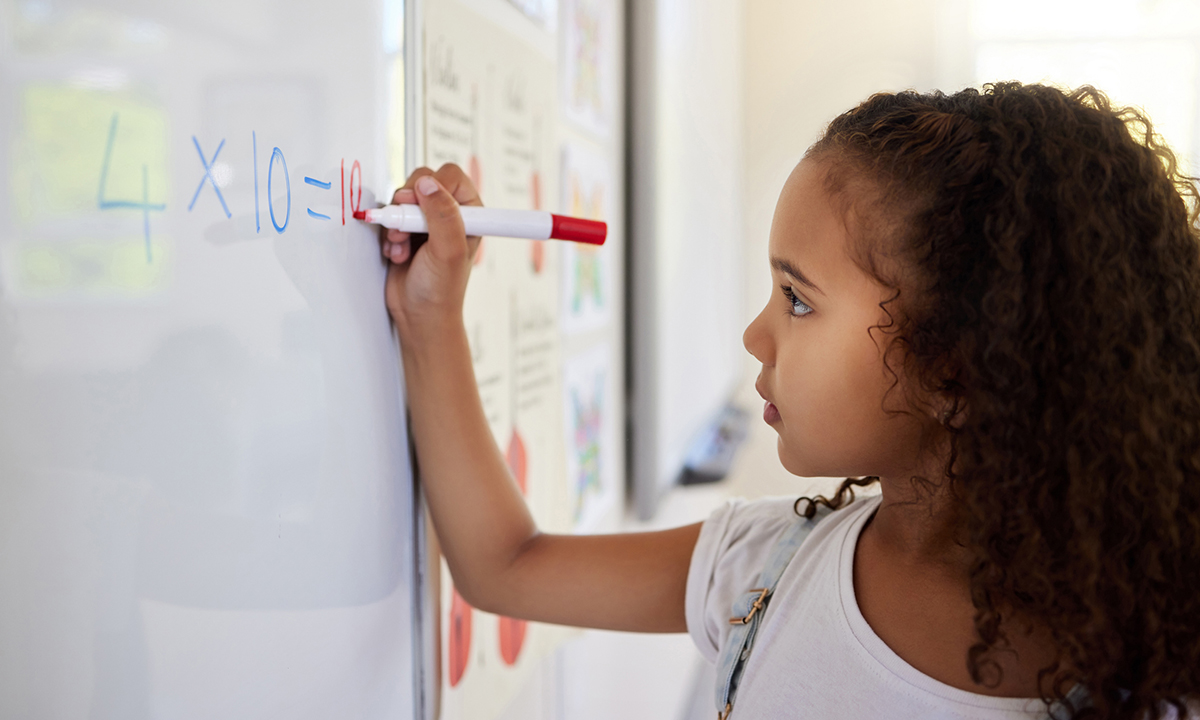Alabama Law Aiming to Bolster Math Learning, Teaching to Be Implemented in 2025
Official said the law tries to help students understand the concepts of math and how they work, rather than just teaching them techniques.

Get stories like this delivered straight to your inbox. Sign up for The 74 Newsletter
An Alabama State Department of Education official told legislators Tuesday that a law aimed at improving student math achievement will be ready for intervention in 2025.
The Numeracy Act, passed in 2022, aims to improve math scores. Karen Anderson, director of math improvement for the Alabama State Department of Education, said the law tries to help students understand the concepts of math and how they work, rather than just teaching them techniques.
“One of the tricks that students are told is when they are dividing a fraction by a fraction you flip it you multiply,” she said. “Well, I want students to understand why that is.”
Anderson said there has been some discussion about the implementation of individual recommendations and questions about the qualifications of math coaches from House members after.
Members of the House Ways and Means Education committee appeared most interested in training ahead of the implementation of the act. Rep. Danny Garrett, R-Trussville, the chair of the committee, asked how the task force, which makes curriculum recommendations, was operating. Anderson said that the task force worked well together.
“We do have very spirited conversations, but I find those spirited conversations frankly very refreshing because we are able to discuss varying points of view, but those conversations do not deter us from our goals,” she said.
Rep. Terri Collins, R-Decatur, asked about specific training, referencing the professional LETRS training used for teachers in conjunction with the Literacy Act, which has the goal of all third-graders reading on grade level.
At this stage, Anderson said, there is no training with the same reputation of quality as LETRS for math.
“Training is not something that you could really jump into just kind of right off the bat, we really need to be sure that teachers have the pedagogy and that they have the content,” she said.
Anderson said they need to ensure teachers with emergency certifications are just as qualified as traditional teachers. Emergency certifications are offered to teachers who have not completed a traditional college or university pathway and have received certification under special circumstances.
In recent years, there has been an effort to implement the science of reading, a multidisciplinary body of research about how children best learn to read. LETRS and the Literacy Act both focus on the science of reading.
Unlike literacy, a science of math has not been widely agreed upon yet.
House Minority Leader Anthony Daniels, D-Huntsville, asked about the qualifications of math coaches, which includes a master’s degree or other approved professional development. Anderson said they are looking for professional development that could be equivalent to a master’s degree.
“We’re in the room scoring resumes and just providing support to districts, so we really want to guide them to find the best possible individuals but simply having a bachelor’s degree is just not enough to serve in this role,” she said.
Daniels said he hopes they will look at the qualifications and experience of people beyond just the degrees that a person holds.
“I just think sometimes we look so much at degrees, to where we end up missing someone that has a proven track record of overcoming all of the odds and their students being able to overcome all of the odds with just a bachelor’s degree but with a number of years of teaching experience,” he said.
In her presentation, Anderson said she hears from people that they can’t do math and don’t like the subject (Garrett identified himself as a math person), and she doesn’t think people would respond to people talking about reading in the same way.
“How many times have you had folks say ‘Ugh, I can’t do math, my mama couldn’t do math, my son probably won’t be able to do math either,’ ” she said. “That has always upset me because if you had heard someone say, ‘Oh, I know about half my letters. I really couldn’t read. Well, my father couldn’t read either.’ You would be really upset about that.”
Alabama Reflector is part of States Newsroom, a network of news bureaus supported by grants and a coalition of donors as a 501c(3) public charity. Alabama Reflector maintains editorial independence. Contact Editor Brian Lyman for questions: info@alabamareflector.com. Follow Alabama Reflector on Facebook and Twitter.
Get stories like these delivered straight to your inbox. Sign up for The 74 Newsletter

;)